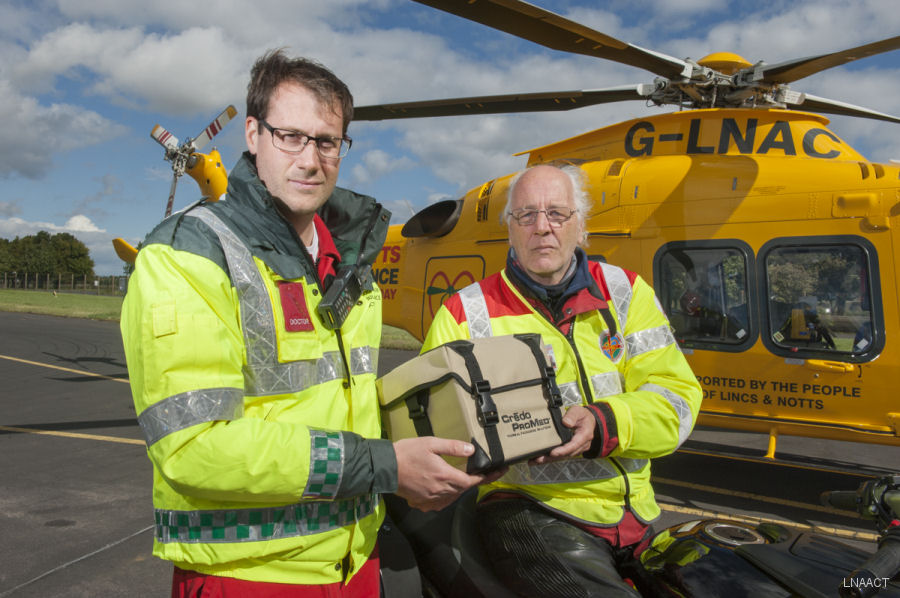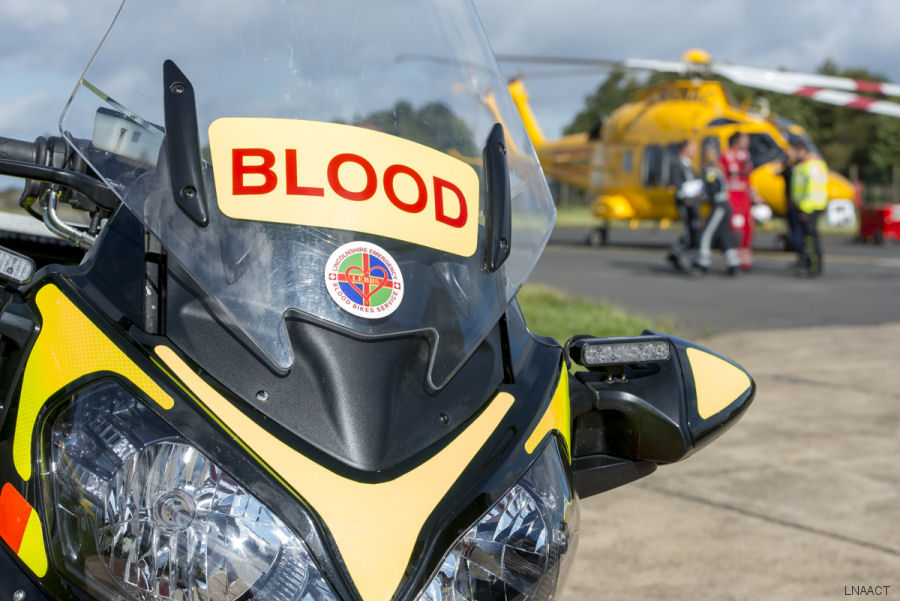LNAACT, September 19, 2017 - By Marie Williamson - After months of preparation and training, the Lincs & Notts Air Ambulance is now carrying blood on board our Ambucopter, enabling our crew to undertake on-site blood transfusions for the very first time.
This will significantly enhance the pre-hospital critical care that our crew can offer at the scene of incidents or accidents, giving patients a better chance of recovery from some of the most devastating injuries. We are one of only six UK air ambulance charities to be able to offer on-site blood transfusions.
Dr David Cookson, the lead doctor overseeing the implementation of the blood on board project, explained: “Recent advances in availability and affordability of devices to keep and administer blood mean that it is now possible for blood transfers to take place outside of a hospital environment, administered by the Lincs & Notts Air Ambulance crew.
“Patients who are bleeding heavily and who have very low blood pressure are often not able to get sufficient oxygen to their vital organs. In these instances, giving the patient blood, as well as other treatments, can help the patient to continue to deliver oxygen around their body which buys them more time before they get to a hospital.”
Charity CEO Karen Jobling added: “The blood is supplied by Lincoln County Hospital and delivered daily by the Lincolnshire Emergency Blood Bikers to our airbase. Our crew have now undergone the specialist training required meaning the Lincs & Notts Air Ambulance can now carry and administer blood.”
Blood is carried by the Ambucopter in specially designed thermostatically controlled boxes, together with a machine to warm it to the correct temperature to administer to patients suffering from dangerously low blood pressure and who have or are suspected to have significant bleeding, vastly increasing their chances of survival.
Paul Bagwell, Chairman of Lincolnshire Emergency Blood Bikes Service, said: “To be able to include the Lincs and Notts Air Ambulance in our service is an honour, providing daily transport will enable blood to be delivered to those that need it and potentially could be the difference between life and death. By returning any unused blood back to Lincoln County Hospital we ensure that it remains in perfect condition and prevents any wastage of this essential resource.”
United Lincolnshire Hospitals NHS Trust Transfusion Practitioner Carol Richardson added: “Providing ‘emergency’ blood to the Ambucopter is a privilege and will undoubtedly save lives. We are so proud to be part of this exciting new venture with the Lincs & Notts Air Ambulance.”
The move was made possible thanks to a donation from the Henry Surtees Foundation which has paid for the extensive training and kit required for the crew to undertake the complex procedure which until recently predominantly took place in hospitals.
Leonora Surtees-Martell, daughter of the late John Surtees CBE said: “Thanks to the magnificent fundraising efforts of the Henry Surtees Foundation and its supporters, the Charity have been able to provide £16,394.40 for Lincs & Notts Air Ambulance enabling them carry out roadside blood transfusions. My father spent most of his life chasing time round the race tracks of the world. He knew that every second counted and none more so than for the Air Ambulance when accidents or illnesses occur. The service that they provide is vital.”
Q&A
- Where does the blood come from?
It is provided by the NHS Blood and Transplant service through Lincoln County Hospital’s blood bank.
- How is it transported to the Ambucopter?
It will be delivered by the Lincolnshire Emergency Blood Bikers.
- Do you carry every blood group?
No, we will just carry the ‘universal’ O negative which all blood types can receive.
- How much blood do you carry?
Two units.
- How do you keep the blood at the required temperature in flight?
The blood will be kept in specially designed cool boxes which maintain the blood between two and six degrees Celsius. We use a fluid warmer before the blood is given to a patient to ensure it is at the correct temperature to administer. This is done instantly; the blood is warmed as it passes through a heating element attached to the tube, meaning that we don’t need to wait before we can start the transfusion.
- How do you know if the blood has been ‘spoiled’ or is the wrong temperature and is unable to be used?
The cool boxes are guaranteed to keep the blood at the right temperature and are regularly checked, but to be absolutely certain we have electronic temperature data loggers in the cool box which flash red if the box has become too hot or too cold.
- How long can you keep the blood if not used?
Our blood will be changed daily; Lincoln County Hospital’s blood bank can put the unused blood back into the bank to be used in hospital patients. Blood is given unselfishly by members of the public and we are very conscious that we must not waste this precious resource.
- Why do we change it daily and not just keep it?
Blood has a shelf life, just like any other product so it is important that it is used within this time. Changing it daily ensures that it doesn’t get wasted.
- Do you take blood to every mission?
Yes as you never know when it is needed. Every morning the blood will be loaded onto the aircraft and each evening it will be taken off for collection by Lincolnshire Emergency Blood Bikers.
- What is the criteria for a patient to qualify for a blood transfusion?
Patients with low blood pressure who we know or suspect are bleeding externally or internally.
- How does giving a blood transfusion at the scene affect the outcome for the patient as opposed to waiting until they arrive at hospital?
Patients who are bleeding and have a very low blood pressure are highly likely to die more quickly because their body cannot deliver oxygen to their vital organs. Giving blood, as well as other treatments, can help a patient’s body to continue to deliver oxygen to their systems and buys them more time to get hospital.
This will significantly enhance the pre-hospital critical care that our crew can offer at the scene of incidents or accidents, giving patients a better chance of recovery from some of the most devastating injuries. We are one of only six UK air ambulance charities to be able to offer on-site blood transfusions.
Dr David Cookson, the lead doctor overseeing the implementation of the blood on board project, explained: “Recent advances in availability and affordability of devices to keep and administer blood mean that it is now possible for blood transfers to take place outside of a hospital environment, administered by the Lincs & Notts Air Ambulance crew.
“Patients who are bleeding heavily and who have very low blood pressure are often not able to get sufficient oxygen to their vital organs. In these instances, giving the patient blood, as well as other treatments, can help the patient to continue to deliver oxygen around their body which buys them more time before they get to a hospital.”
Charity CEO Karen Jobling added: “The blood is supplied by Lincoln County Hospital and delivered daily by the Lincolnshire Emergency Blood Bikers to our airbase. Our crew have now undergone the specialist training required meaning the Lincs & Notts Air Ambulance can now carry and administer blood.”
Blood is carried by the Ambucopter in specially designed thermostatically controlled boxes, together with a machine to warm it to the correct temperature to administer to patients suffering from dangerously low blood pressure and who have or are suspected to have significant bleeding, vastly increasing their chances of survival.
Paul Bagwell, Chairman of Lincolnshire Emergency Blood Bikes Service, said: “To be able to include the Lincs and Notts Air Ambulance in our service is an honour, providing daily transport will enable blood to be delivered to those that need it and potentially could be the difference between life and death. By returning any unused blood back to Lincoln County Hospital we ensure that it remains in perfect condition and prevents any wastage of this essential resource.”
United Lincolnshire Hospitals NHS Trust Transfusion Practitioner Carol Richardson added: “Providing ‘emergency’ blood to the Ambucopter is a privilege and will undoubtedly save lives. We are so proud to be part of this exciting new venture with the Lincs & Notts Air Ambulance.”
The move was made possible thanks to a donation from the Henry Surtees Foundation which has paid for the extensive training and kit required for the crew to undertake the complex procedure which until recently predominantly took place in hospitals.
Leonora Surtees-Martell, daughter of the late John Surtees CBE said: “Thanks to the magnificent fundraising efforts of the Henry Surtees Foundation and its supporters, the Charity have been able to provide £16,394.40 for Lincs & Notts Air Ambulance enabling them carry out roadside blood transfusions. My father spent most of his life chasing time round the race tracks of the world. He knew that every second counted and none more so than for the Air Ambulance when accidents or illnesses occur. The service that they provide is vital.”
Q&A
- Where does the blood come from?
It is provided by the NHS Blood and Transplant service through Lincoln County Hospital’s blood bank.
- How is it transported to the Ambucopter?
It will be delivered by the Lincolnshire Emergency Blood Bikers.
- Do you carry every blood group?
No, we will just carry the ‘universal’ O negative which all blood types can receive.
- How much blood do you carry?
Two units.
- How do you keep the blood at the required temperature in flight?
The blood will be kept in specially designed cool boxes which maintain the blood between two and six degrees Celsius. We use a fluid warmer before the blood is given to a patient to ensure it is at the correct temperature to administer. This is done instantly; the blood is warmed as it passes through a heating element attached to the tube, meaning that we don’t need to wait before we can start the transfusion.
- How do you know if the blood has been ‘spoiled’ or is the wrong temperature and is unable to be used?
The cool boxes are guaranteed to keep the blood at the right temperature and are regularly checked, but to be absolutely certain we have electronic temperature data loggers in the cool box which flash red if the box has become too hot or too cold.
- How long can you keep the blood if not used?
Our blood will be changed daily; Lincoln County Hospital’s blood bank can put the unused blood back into the bank to be used in hospital patients. Blood is given unselfishly by members of the public and we are very conscious that we must not waste this precious resource.
- Why do we change it daily and not just keep it?
Blood has a shelf life, just like any other product so it is important that it is used within this time. Changing it daily ensures that it doesn’t get wasted.
- Do you take blood to every mission?
Yes as you never know when it is needed. Every morning the blood will be loaded onto the aircraft and each evening it will be taken off for collection by Lincolnshire Emergency Blood Bikers.
- What is the criteria for a patient to qualify for a blood transfusion?
Patients with low blood pressure who we know or suspect are bleeding externally or internally.
- How does giving a blood transfusion at the scene affect the outcome for the patient as opposed to waiting until they arrive at hospital?
Patients who are bleeding and have a very low blood pressure are highly likely to die more quickly because their body cannot deliver oxygen to their vital organs. Giving blood, as well as other treatments, can help a patient’s body to continue to deliver oxygen to their systems and buys them more time to get hospital.
AW169 G-LNAC ( UK Air Ambulances )
See also |
LNAACT
Essex & Herts Air Ambulance Carry Blood Supplies






